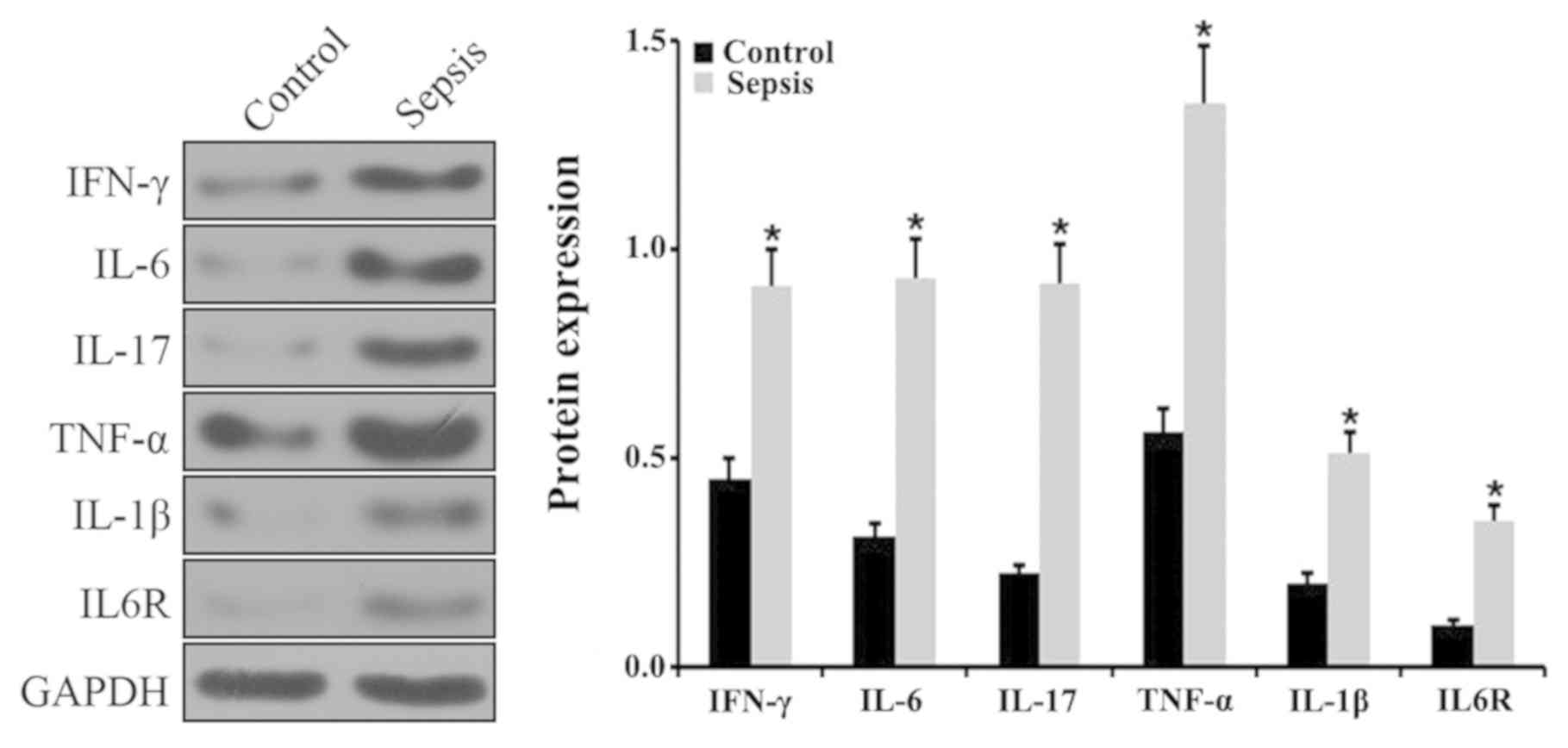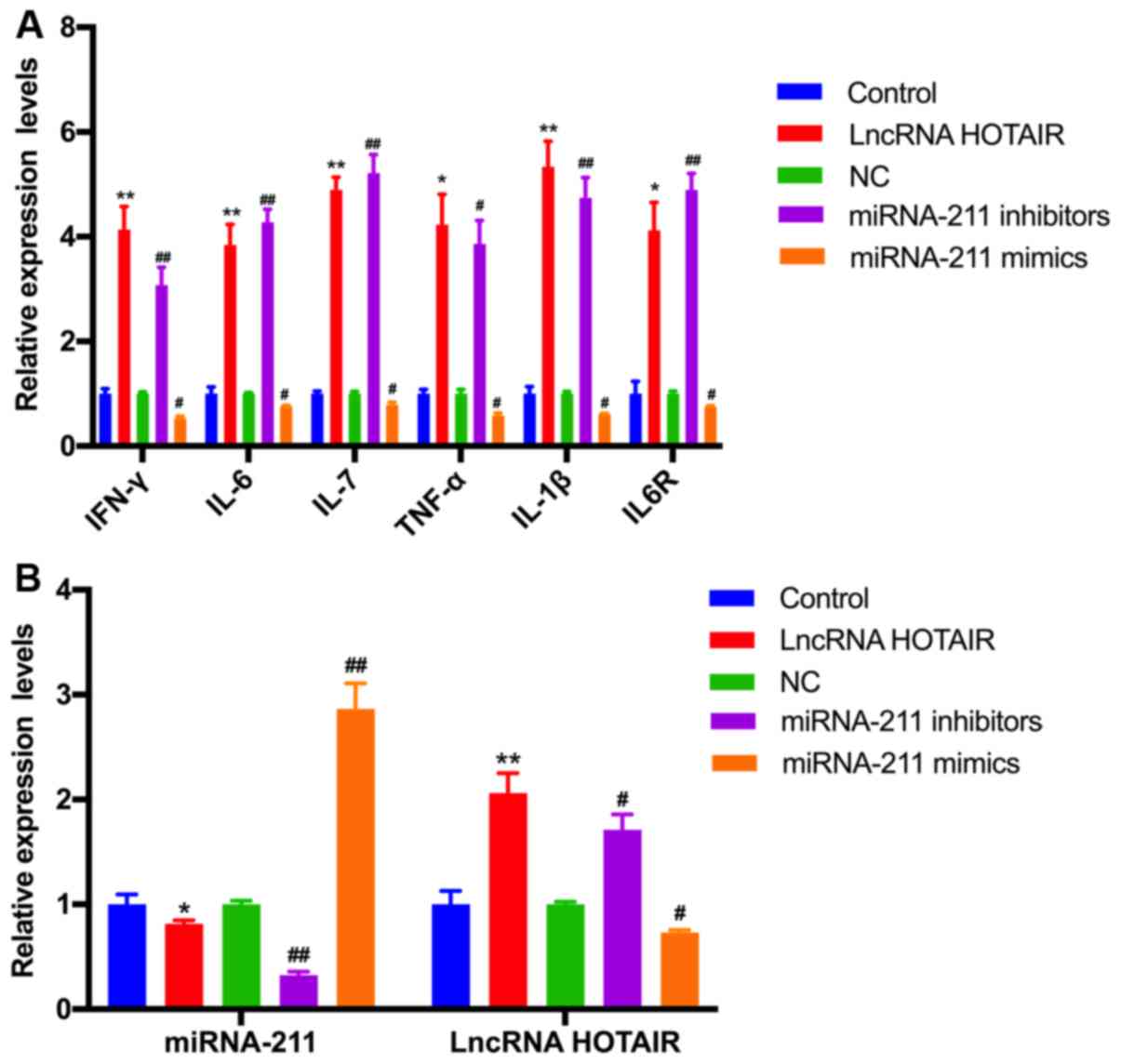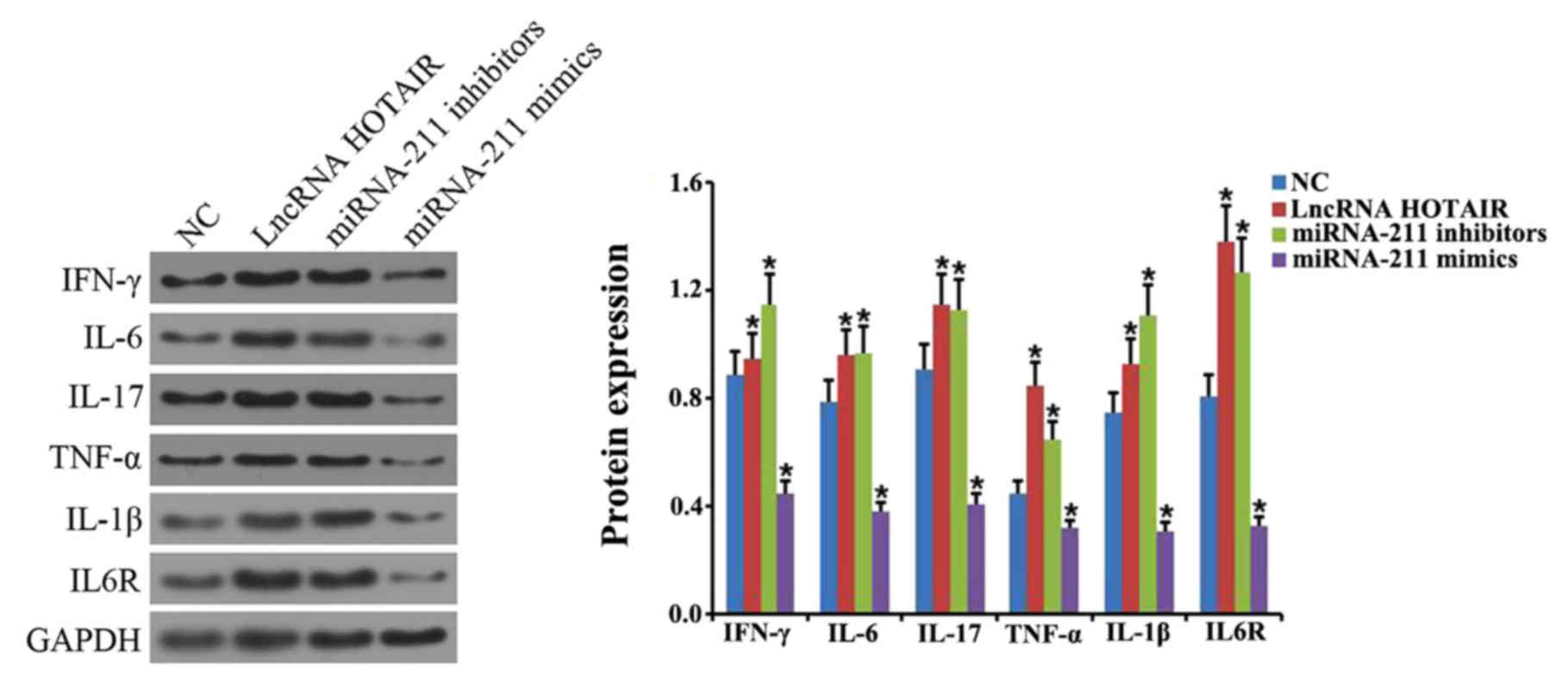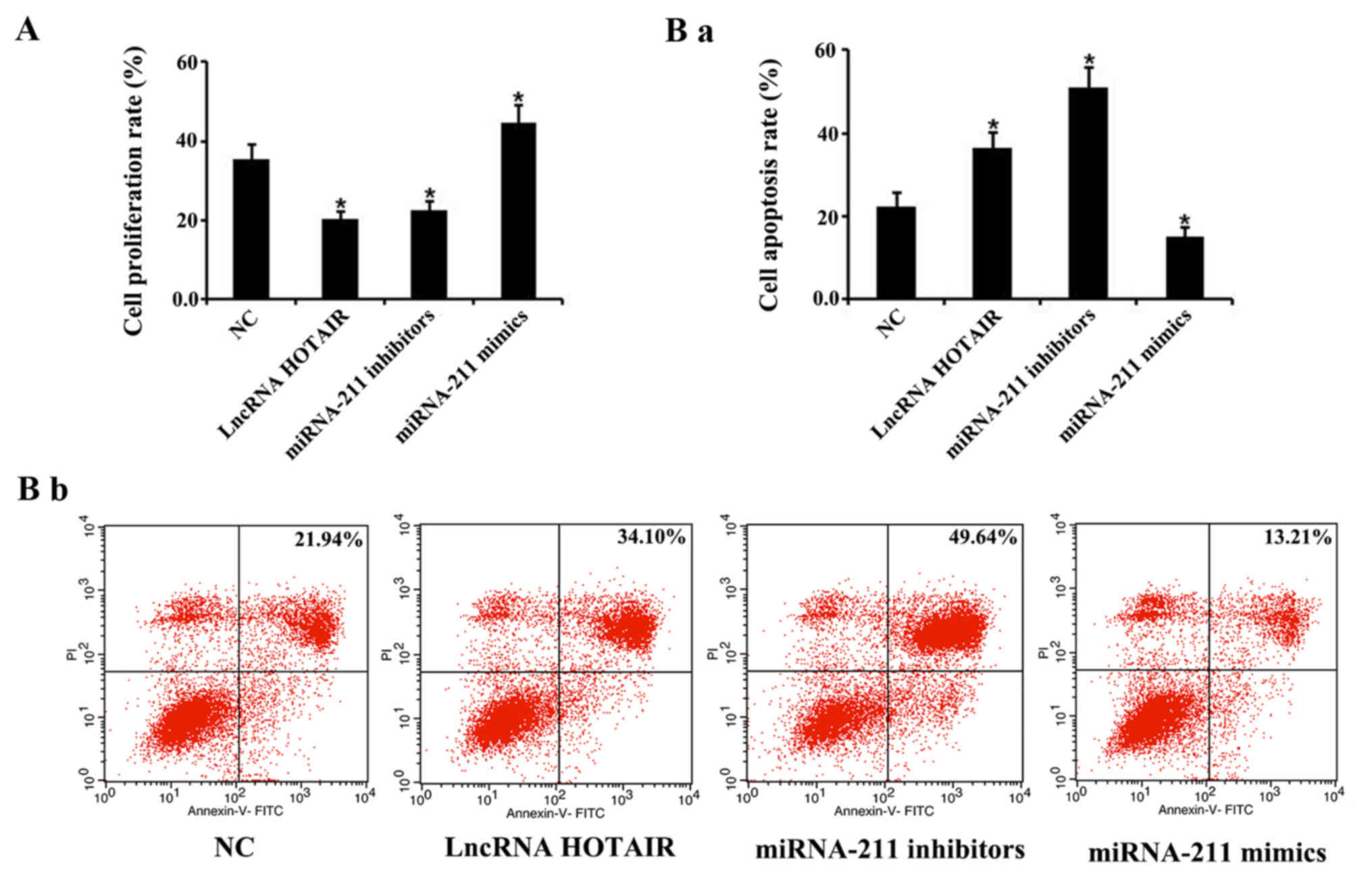|
1
|
Sagy M, Al-Qaqaa Y and Kim P: Definitions
and pathophysiology of sepsis. Curr Probl Pediatr Adolesc Health
Care. 43:260–263. 2013. View Article : Google Scholar : PubMed/NCBI
|
|
2
|
Mohamed AKS, Mehta AA and James P:
Predictors of mortality of severe sepsis among adult patients in
the medical Intensive Care Unit. Lung India. 34:330–335. 2017.
View Article : Google Scholar : PubMed/NCBI
|
|
3
|
van Vught LA, Wiewel MA, Hoogendijk AJ,
Frencken JF, Scicluna BP, Klein Klouwenberg PMC, Zwinderman AH,
Lutter R, Horn J, Schultz MJ, et al: The host response in sepsis
patients developing intensive care unit-acquired secondary
Infections. Am J Respir Crit Care Med. 196:458–470. 2017.
View Article : Google Scholar : PubMed/NCBI
|
|
4
|
Sánchez B, Ferrer R, Suarez D, Romay E,
Piacentini E, Gomà G, Martínez ML and Artigas A; Edusepsis Study
Group, : Declining mortality due to severe sepsis and septic shock
in Spanish intensive care units: A two-cohort study in 2005 and
2011. Med Intensiva. 41:28–37. 2017. View Article : Google Scholar : PubMed/NCBI
|
|
5
|
Hotchkiss RS, Coopersmith CM, McDunn JE
and Ferguson TA: The sepsis seesaw: Tilting toward
immunosuppression. Nat Med. 15:496–497. 2009. View Article : Google Scholar : PubMed/NCBI
|
|
6
|
Jiang W, Zhong W, Deng Y, Chen C, Wang Q,
Zhou M, Li X, Sun C and Zeng H: Evaluation of a combination
‘lymphocyte apoptosis model’ to predict survival of sepsis patients
in an intensive care unit. BMC Anesthesiol. 18:892018. View Article : Google Scholar : PubMed/NCBI
|
|
7
|
Gill SE, Rohan M and Mehta S: Role of
pulmonary microvascular endothelial cell apoptosis in murine
sepsis-induced lung injury in vivo. Respir Res. 16:1092015.
View Article : Google Scholar : PubMed/NCBI
|
|
8
|
Pool R, Gomez H and Kellum JA: Mechanisms
of organ dysfunction in sepsis. Crit Care Clin. 34:63–80. 2018.
View Article : Google Scholar : PubMed/NCBI
|
|
9
|
Halimulati M, Duman B, Nijiati J and
Aizezi A: Long noncoding RNA TCONS_00024652 regulates vascular
endothelial cell proliferation and angiogenesis via microRNA 21.
Exp Ther Med. 16:3309–3316. 2018.PubMed/NCBI
|
|
10
|
Li TT, He RQ, Ma J, Li ZY, Hu XH and Chen
G: Long non-coding RNAs in small cell lung cancer: A potential
opening to combat the disease (Review). Oncol Rep. 40:1831–1842.
2018.PubMed/NCBI
|
|
11
|
Ling Z, Liu D, Zhang G, Liang Q, Xiang P,
Xu Y, Han C and Tao T: miR-361-5p modulates metabolism and
autophagy via the Sp1-mediated regulation of PKM2 in prostate
cancer. Oncol Rep. 38:1621–1628. 2017. View Article : Google Scholar : PubMed/NCBI
|
|
12
|
Ni X, Liao Y, Li L, Zhang X and Wu Z:
Therapeutic role of long non-coding RNA TCONS_00019174 in
depressive disorders is dependent on Wnt/β-catenin signaling
pathway. J Integr Neurosci. 17:125–132. 2018. View Article : Google Scholar : PubMed/NCBI
|
|
13
|
Zhang TN, Li D, Xia J, Wu QJ, Wen R, Yang
N and Liu CF: Non-coding RNA: A potential biomarker and therapeutic
target for sepsis. Oncotarget. 8:91765–91778. 2017.PubMed/NCBI
|
|
14
|
Diamantopoulos MA, Tsiakanikas P and
Scorilas A: Non-coding RNAs: The riddle of the transcriptome and
their perspectives in cancer. Ann Transl Med. 6:2412018. View Article : Google Scholar : PubMed/NCBI
|
|
15
|
Gibbons A, Udawela M and Dean B:
Non-coding RNA as novel players in the pathophysiology of
schizophrenia. Noncoding RNA. 4(pii): E112018.PubMed/NCBI
|
|
16
|
Bartel DP: MicroRNAs: Genomics,
biogenesis, mechanism, and function. Cell. 116:281–297. 2004.
View Article : Google Scholar : PubMed/NCBI
|
|
17
|
O'Connell RM, Rao DS and Baltimore D:
microRNA regulation of inflammatory responses. Annu Rev Immunol.
30:295–312. 2012. View Article : Google Scholar : PubMed/NCBI
|
|
18
|
Schoof CR, Botelho EL, Izzotti A and
Vasques Ldos R: MicroRNAs in cancer treatment and prognosis. Am J
Cancer Res. 2:414–433. 2012.PubMed/NCBI
|
|
19
|
Qiu L, Tan EK and Zeng L: microRNAs and
neurodegenerative diseases. Adv Exp Med Biol. 888:85–105. 2015.
View Article : Google Scholar : PubMed/NCBI
|
|
20
|
Bhan A, Soleimani M and Mandal SS: Long
noncoding RNA and cancer: A new paradigm. Cancer Res. 77:3965–3981.
2017. View Article : Google Scholar : PubMed/NCBI
|
|
21
|
Kondo Y, Shinjo K and Katsushima K: Long
non-coding RNAs as an epigenetic regulator in human cancers. Cancer
Sci. 108:1927–1933. 2017. View Article : Google Scholar : PubMed/NCBI
|
|
22
|
Uchida S and Dimmeler S: Long noncoding
RNAs in cardiovascular diseases. Circ Res. 116:737–750. 2015.
View Article : Google Scholar : PubMed/NCBI
|
|
23
|
Tang Y, Zhou T, Yu X, Xue Z and Shen N:
The role of long non-coding RNAs in rheumatic diseases. Nat Rev
Rheumatol. 13:657–669. 2017. View Article : Google Scholar : PubMed/NCBI
|
|
24
|
Rong D, Sun H, Li Z, Liu S, Dong C, Fu K,
Tang W and Cao H: An emerging function of circRNA-miRNAs-mRNA axis
in human diseases. Oncotarget. 8:73271–73281. 2017. View Article : Google Scholar : PubMed/NCBI
|
|
25
|
Loewen G, Jayawickramarajah J, Zhuo Y and
Shan B: Functions of lncRNA HOTAIR in lung cancer. J Hematol Oncol.
7:902014. View Article : Google Scholar : PubMed/NCBI
|
|
26
|
Ling Z, Wang X, Tao T, Zhang L, Guan H,
You Z, Lu K, Zhang G, Chen S, Wu J, et al: Involvement of
aberrantly activated HOTAIR/EZH2/miR-193a feedback loop in
progression of prostate cancer. J Exp Clin Cancer Res. 36:1592017.
View Article : Google Scholar : PubMed/NCBI
|
|
27
|
Liu XH, Sun M, Nie FQ, Ge YB, Zhang EB,
Yin DD, Kong R, Xia R, Lu KH, Li JH, et al: Lnc RNA HOTAIR
functions as a competing endogenous RNA to regulate HER2 expression
by sponging miR-331-3p in gastric cancer. Mol Cancer. 13:922014.
View Article : Google Scholar : PubMed/NCBI
|
|
28
|
Lu X, Liu Z, Ning X, Huang L and Jiang B:
The long noncoding RNA HOTAIR promotes colorectal cancer
progression by sponging miR-197. Oncol Res. 26:473–481. 2018.
View Article : Google Scholar : PubMed/NCBI
|
|
29
|
Wu H, Liu J, Li W, Liu G and Li Z:
LncRNA-HOTAIR promotes TNF-α production in cardiomyocytes of
LPS-induced sepsis mice by activating NF-κB pathway. Biochem
Biophys Res Commun. 471:240–246. 2016. View Article : Google Scholar : PubMed/NCBI
|
|
30
|
Bosmann M and Ward PA: The inflammatory
response in sepsis. Trends Immunol. 34:129–136. 2013. View Article : Google Scholar : PubMed/NCBI
|
|
31
|
Walborn A, Hoppensteadt D, Syed D, Mosier
M and Fareed J: Biomarker profile of sepsis-associated coagulopathy
using biochip assay for inflammatory cytokines. Clin Appl Thromb
Hemost. 24:625–632. 2018. View Article : Google Scholar : PubMed/NCBI
|
|
32
|
Schulte W, Bernhagen J and Bucala R:
Cytokines in sepsis: Potent immunoregulators and potential
therapeutic targets-an updated view. Mediators Inflam.
2013:1659742013. View Article : Google Scholar
|
|
33
|
Shao WX, Yu DJ, Zhang WY and Wang XJ:
Clinical significance of IL-6 in the diagnosis of sepsis and
discriminating sepsis induced by gram-negative bacteria. Pediatr
Infect Dis J. 37:801–805. 2018. View Article : Google Scholar : PubMed/NCBI
|
|
34
|
Zhang W and He J: Interleukin-6 is a key
factor for immunoglobulin-like transcript-4-mediated immune injury
in sepsis. J Intensive Care. 6:222018. View Article : Google Scholar : PubMed/NCBI
|
|
35
|
Chen Y, Lin MC, Yao H, Wang H, Zhang AQ,
Yu J, Hui CK, Lau GK, He ML, Sung J and Kung HF:
Lentivirus-mediated RNA interference targeting enhancer of zeste
homolog 2 inhibits hepatocellular carcinoma growth through
down-regulation of stathmin. Hepatology. 46:200–208. 2007.
View Article : Google Scholar : PubMed/NCBI
|
|
36
|
Jiang L, Lai YK, Zhang J, Wang H, Lin MC,
He ML and Kung HF: Targeting S100P inhibits colon cancer growth and
metastasis by Lentivirus-mediated RNA interference and proteomic
analysis. Mol Med. 17:709–716. 2011. View Article : Google Scholar : PubMed/NCBI
|
|
37
|
Livak KJ and Schmittgen TD: Analysis of
relative gene expression data using real-time quantitative PCR and
the 2(-Delta Delta C(T)) Method. Methods. 25:402–408. 2001.
View Article : Google Scholar : PubMed/NCBI
|
|
38
|
Liu S, Li JH, Wu J, Zhou KR, Zhou H, Yang
JH and Qu LH: StarScan: A web server for scanning small RNA targets
from degradome sequencing data. Nucleic Acids Res. 43:W480–W486.
2015. View Article : Google Scholar : PubMed/NCBI
|
|
39
|
Yang JH, Li JH, Shao P, Zhou H, Chen YQ
and Qu LH: starBase: A database for exploring microRNA-mRNA
interaction maps from Argonaute CLIP-Seq and Degradome-Seq data.
Nucleic Acids Res 39 (Database Issue). D202–D209. 2011. View Article : Google Scholar
|
|
40
|
Wong N and Wang X: miRDB: An online
resource for microRNA target prediction and functional annotations.
Nucleic Acids Res 43 (Database Issue). D146–D152. 2015. View Article : Google Scholar
|
|
41
|
Rinn JL, Kertesz M, Wang JK, Squazzo SL,
Xu X, Brugmann SA, Goodnough LH, Helms JA, Farnham PJ, Segal E and
Chang HY: Functional demarcation of active and silent chromatin
domains in human HOX loci by noncoding RNAs. Cell. 129:1311–1323.
2007. View Article : Google Scholar : PubMed/NCBI
|
|
42
|
Bhan A and Mandal SS: LncRNA HOTAIR: A
master regulator of chromatin dynamics and cancer. Biochim Biophys
Acta. 1856:151–164. 2015.PubMed/NCBI
|
|
43
|
Hu ML, Wang XY and Chen WM: TGF-β1
upregulates the expression of lncRNA UCA1 and its downstream HXK2
to promote the growth of hepatocellular carcinoma. Eur Rev Med
Pharmacol Sci. 22:4846–4854. 2018.PubMed/NCBI
|
|
44
|
Perrot-Applanat M, Kolf-Clauw M, Michel C
and Beausoleil C: Alteration of mammary gland development by
bisphenol a and evidence of a mode of action mediated through
endocrine disruption. Mol Cell Endocrinol. 475:29–53. 2018.
View Article : Google Scholar : PubMed/NCBI
|
|
45
|
Han L, Zhang HC, Li L, Li CX, Di X and Qu
X: Downregulation of long noncoding RNA HOTAIR and EZH2 induces
apoptosis and inhibits proliferation, invasion, and migration of
human breast cancer cells. Cancer Biother Radiopharm. 33:241–251.
2018. View Article : Google Scholar : PubMed/NCBI
|
|
46
|
Huang J, Ke P, Guo L, Wang W, Tan H, Liang
Y and Yao S: Lentivirus-mediated RNA interference targeting the
long noncoding RNA HOTAIR inhibits proliferation and invasion of
endometrial carcinoma cells in vitro and in vivo. Int J Gynecol
Cancer. 24:635–642. 2014. View Article : Google Scholar : PubMed/NCBI
|
|
47
|
Yuki K and Murakami N: Sepsis
pathophysiology and anesthetic consideration. Cardiovasc Hematol
Disord Drug Targets. 15:57–69. 2015. View Article : Google Scholar : PubMed/NCBI
|
|
48
|
Bone RC, Grodzin CJ and Balk RA: Sepsis: A
new hypothesis for pathogenesis of the disease process. Chest.
112:235–243. 1997. View Article : Google Scholar : PubMed/NCBI
|
|
49
|
Ge L, Hu Q, Chen J, Shi M, Yang H and Zhu
G: Inhibition of TNF-α sepsis of lipopolysaccharide induction using
nano cerium oxide system. Mater Sci Eng C Mater Biol Appl.
77:405–410. 2017. View Article : Google Scholar : PubMed/NCBI
|
|
50
|
Zhang Y, Cui X, Ning L and Wei D: The
effects of tumor necrosis factor-α (TNF-α) rs1800629 and rs361525
polymorphisms on sepsis risk. Oncotarget. 8:111456–111469.
2017.PubMed/NCBI
|
|
51
|
Gao H, Liu L, Zhao Y, Hara H, Chen P, Xu
J, Tang J, Wei L, Li Z, Cooper DKC, et al: Human IL-6, IL-17,
IL-1β, and TNF-α differently regulate the expression of
pro-inflammatory related genes, tissue factor and swine leukocyte
antigen class I in porcine aortic endothelial cells.
Xenotransplantation. 24:2017. View Article : Google Scholar
|
|
52
|
Feng S, Yu H, Yu Y, Geng Y, Li D, Yang C,
Lv Q, Lu L, Liu T, Li G and Yuan L: Levels of inflammatory
cytokines IL-1β, IL-6, IL-8, IL-17A, and TNF-α in aqueous humour of
patients with diabetic retinopathy. J Diabetes Res.
2018:85464232018. View Article : Google Scholar : PubMed/NCBI
|
|
53
|
McGuire TR, Reardon NT, Bogard K, Plumb
TJ, Bultsma CJ, Nissen SW, Fuller PD and Olsen KM: IL6 plasma
concentrations in patients with sepsis receiving SLED and
antibiotics: A predictor for survival. In Vivo. 28:1131–1134.
2014.PubMed/NCBI
|
|
54
|
Philip AM, Wang Y, Mauro A, El-Rass S,
Marshall JC, Lee WL, Slutsky AS, dosSantos CC and Wen XY:
Development of a zebrafish sepsis model for high-throughput drug
discovery. Mol Med. 23:134–148. 2017. View Article : Google Scholar : PubMed/NCBI
|
|
55
|
Shen L, Sun Z, Zhao F, Wang W, Zhang W and
Zhu H: Expression of c-FLIP in a rat model of sepsis and its
effects on endothelial apoptosis. Mol Med Rep. 16:231–237. 2017.
View Article : Google Scholar : PubMed/NCBI
|
|
56
|
Buras JA, Holzmann B and Sitkovsky M:
Animal models of sepsis: Setting the stage. 4:854–865.
2005.PubMed/NCBI
|
|
57
|
Rittirsch D, Hoesel LM and Ward PA: The
disconnect between animal models of sepsis and human sepsis. J
Leukoc Biol. 81:137–143. 2007. View Article : Google Scholar : PubMed/NCBI
|
|
58
|
Chang R, Holcomb JB, Johansson PI, Pati S,
Schreiber MA and Wade CE: Plasma resuscitation improved survival in
a cecal ligation and puncture rat model of sepsis. Shock. 49:53–61.
2018. View Article : Google Scholar : PubMed/NCBI
|
|
59
|
Oberbaum M, Spira RM, Lukasiewicz E, Armon
Y, Samuels N, Singer SR, Barak V, Izbicki G, Einav S and Hersch M:
Effect of Traumeel S on cytokine profile in a cecal ligation and
puncture (CLP) sepsis model in rats. J Altern Complement Med.
17:909–913. 2011. View Article : Google Scholar : PubMed/NCBI
|
|
60
|
Zhang J, Bi J, Liu S, Pang Q, Zhang R,
Wang S and Liu C: 5-HT Drives Mortality in Sepsis Induced by Cecal
Ligation and Puncture in Mice. Mediators Inflamm. 2017:63742832017.
View Article : Google Scholar : PubMed/NCBI
|
|
61
|
Sakai M, Suzuki T, Tomita K, Yamashita S,
Palikhe S, Hattori K, Yoshimura N, Matsuda N and Hattori Y:
Diminished responsiveness to dobutamine as an inotrope in mice with
cecal ligation and puncture-induced sepsis: Attribution to
phosphodiesterase 4 upregulation. Am J Physiol Heart Circ Physiol.
312:H1224–H1237. 2017. View Article : Google Scholar : PubMed/NCBI
|
|
62
|
Iskander KN, Craciun FL, Stepien DM, Duffy
ER, Kim J, Moitra R, Vaickus LJ, Osuchowski MF and Remick DG: Cecal
ligation and puncture-induced murine sepsis does not cause lung
injury. Crit Care Med. 41:159–170. 2013. View Article : Google Scholar : PubMed/NCBI
|
|
63
|
Jiang ZJ, Zhang MY, Fan ZW, Sun WL and
Tang Y: Influence of lncRNA HOTAIR on acute kidney injury in sepsis
rats through regulating miR-34a/Bcl-2 pathway. Eur Rev Med
Pharmacol Sci. 23:3512–3519. 2019.PubMed/NCBI
|
|
64
|
Chen H, Wang X, Yan X, Cheng X, He X and
Zheng W: LncRNA MALAT1 regulates sepsis-induced cardiac
inflammation and dysfunction via interaction with miR-125b and p38
MAPK/NFκB. Int Immunopharmacol. 55:69–76. 2018. View Article : Google Scholar : PubMed/NCBI
|
|
65
|
Huang W, Lan X, Li X, Wang D, Sun Y, Wang
Q, Gao H and Yu K: Long non-coding RNA PVT1 promote LPS-induced
septic acute kidney injury by regulating TNFα and JNK/NF-κB
pathways in HK-2 cells. Int Immunopharmacol. 47:134–140. 2017.
View Article : Google Scholar : PubMed/NCBI
|





















